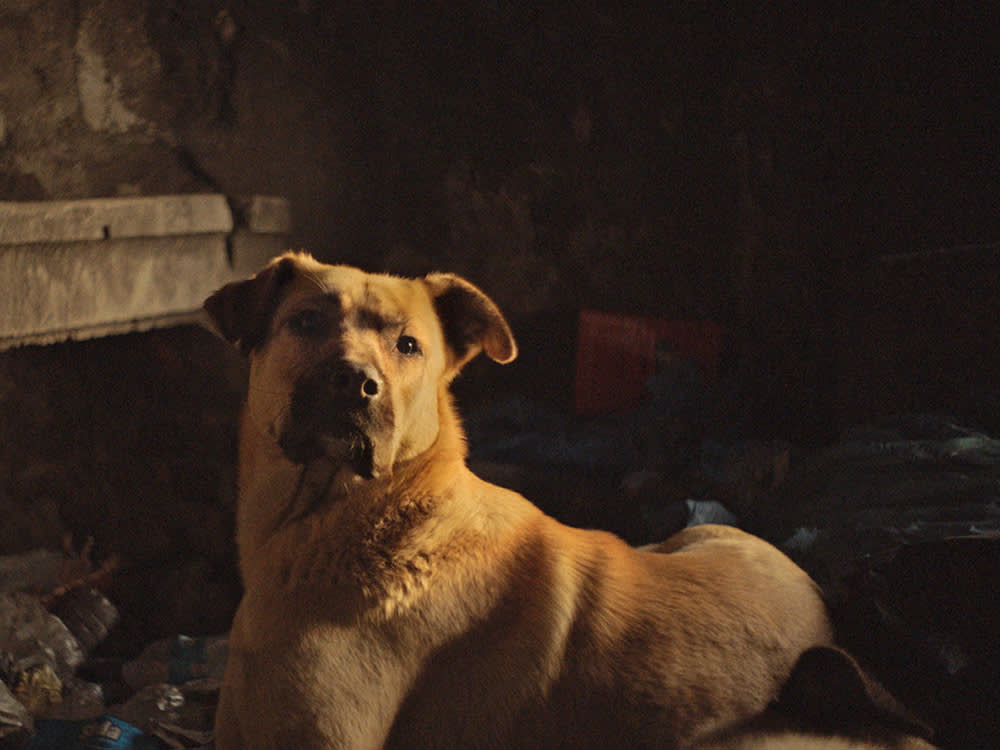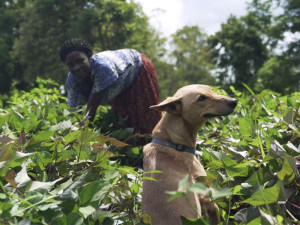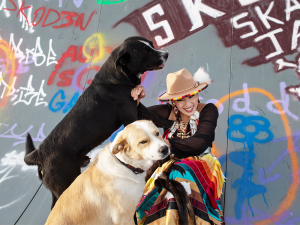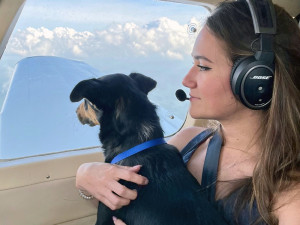‘Stray’ Review: A Documentary Masterpiece Capturing Istanbul’s Street Dogs
Documentary filmmaker Elizabeth Lo’s first full-length feature is a masterpiece.
Spoiler alert: No animals are harmed in this film, and definitely, no dogs die. That might be a strange way to start a film review, but in this case, I’m sure the filmmaker, Elizabeth Loopens in new tab, will understand. She’s said that her impetus for making Strayopens in new tab, her first full-length feature film, was the death of her dog and her experience of the grieving process. It was a transformative moment for her—as she puts it, and the event that “propels Stray’s exploration into value, hierarchy and sentience.”
This quiet but yet extraordinary film takes place in and around Turkey’s capital city of Istanbul. It follows three unrelated stray dogs, adults Zeytin and Nazar and pup Kartal. Of the three, Zeytin is the lead protagonist of the 72-minute film. Though stately and magnificent, she’s also vulnerable. Without dipping too deeply into anthropomorphism, I felt that she seized the camera lens. Like film divas of yesteryear—Marlene, Greta or Ingrid—she captivates the viewer.
Turkey has had a fraught history with its stray-dog population. In the last century, it tried to annihilate them, but starting in 2004, it changed its policy in the face of widespread protests against these killings. Today, Turkey is the only country where it is actually illegal to euthanize stray dogs, or even to hold them captive. The country’s unowned dogs are free-roaming; as Lo has said, referencing the status of these dogs, they are “emblem[s] of resistance—living manifestations of compassion in the face of intolerance.”
The film, which has a nontraditional narrative, does not follow a single story arc. Rather, Lo notes that she left the narrative up to the dogs themselves. Her intent was to capture, lyrically and effectively, the unowned dogs’ day-to-day lives—what they face in their daily searches for food, shelter and, to some degree, company. That in itself is fascinating to any dog-lover. Lo’s camera also captures the dogs’ intersections with a trio of homeless Syrian refugees, young men who seem to be the ones who have given the dogs names.
How much do you spend on your pet per year?
While the dogs don’t live with these young men, they do spend time with them, almost as though they are palling around with them. When the boys call their names, the dogs come running. Often accompanied by the dogs, the boys look for places to sleep in construction sites or simply on a quiet sidewalk; sadly, they also look spots where they can indulge in their glue-sniffing habit.
By snuggling with the boys as they sleep, the dogs function as both their protectors and sources of warmth, somewhat offsetting the lack of blankets and bedding. One can definitely see their genuine love and interdependency, the ways boys and dogs create a makeshift family group on the margins of society.
Though the film does not have a script, per se, it does have a distinctive aural quality, incorporating “found sounds”—street sounds or snatches of overheard conversation coming from nearby cafés (often having to do with relationship problems) recorded using a bi-directional microphone. Surprisingly, we hear an exchange involving a sanitation worker, who jumps off his truck to accuse one of the other female dogs of being “a selfish asshole” when the dog steals a bone from Zeytin even though she was given one as well. He prevents a fight and takes the stolen bone back to Zeytin. Another comes when a father gives his toddler a bit of food to offer to the dogs, assuring the child that the gentle dogs won’t hurt her. There are also cases when people aren’t kind or big-hearted to the dogs, but there is no out-and-out cruelty.
Along with a classical, evocative original score by Ali Helnwein to set the stage, Lo deploys billboard-like quotes from ancient philosophers to underscore, or perhaps even help explain, her intent, namely to tell a story about “lived experiences of those whom society has left behind.”
Cleverly and effectively, the action will pause and quotes from ancient philosophers will appear onscreen. For example, “Dogs and philosophers do the greatest good and get the fewest rewards” (Diogenes, 368 BCE), or “Dogs keep watch over human beings, not to ensure that they do not lose their property, but rather that they do not get robbed of their integrity” (Themistius, 317 CE).
Some might wonder how (and why) a Muslim country established this humane law about street dogs. Regardless, Turkey provides amazing examples that other countries can learn from. While they aren’t directly included in this film, organizations such as Animal Rights Federation in Turkeyopens in new tab (which appears in the credits) have run successful humane campaigns. Among them are “one container of water,” which provides water to street dogs and stray cats, and “push the brakes,” which urges people to take responsibility if they injure an animal. The latter is particularly apt; many scenes in this film show dogs, albeit with a certain amount of street smarts, having to cross very busy roadways. And best of all is the kiosk from a company called Pugedon that “trades” pet food for a plastic bottle. Pop the used bottle into a slot, and out comes the kibble for a hungry dog.
What I especially appreciated was the way that Lo demonstrated that Zeytin and the other dogs were not defined by their relationships to humans. While they spent time with the boys, we also see them as they “traverse across class, ethnic and gender lines in a way only stray dogs can.” That makes the final scene of the film all that more poignant. It had me weeping, not out of sadness but because the scene itself was so moving, and so cinematically extraordinary.
As the credit roll starts, in a full screenshot, we see the lovely Zeytin resting on a patch of ground in what looks like the city’s outskirts. Then an azan, call to prayer, from a nearby mosque begins. At that, Zeytin lifts her head and tilts it towards the sound. She then joins in, howling and howling and howling, for almost two full minutes. Both the azan and the dog’s own soulful song go straight to your heart, as will this exceptional film.
For more information on streaming Stray, visit the official site.opens in new tab







